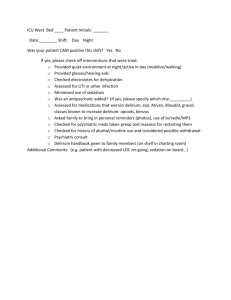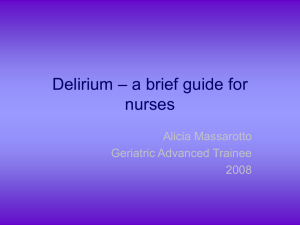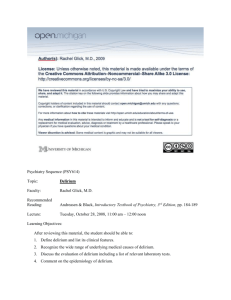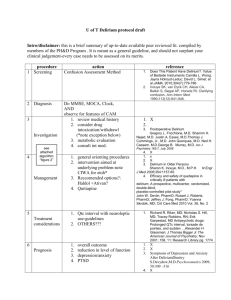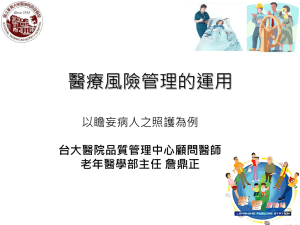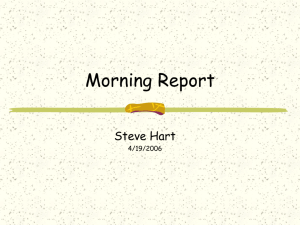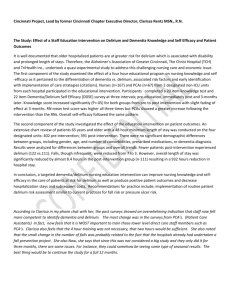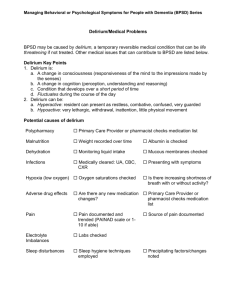ABSTRACT: 2014 ELAM Institutional Action Project Poster Symposium
advertisement
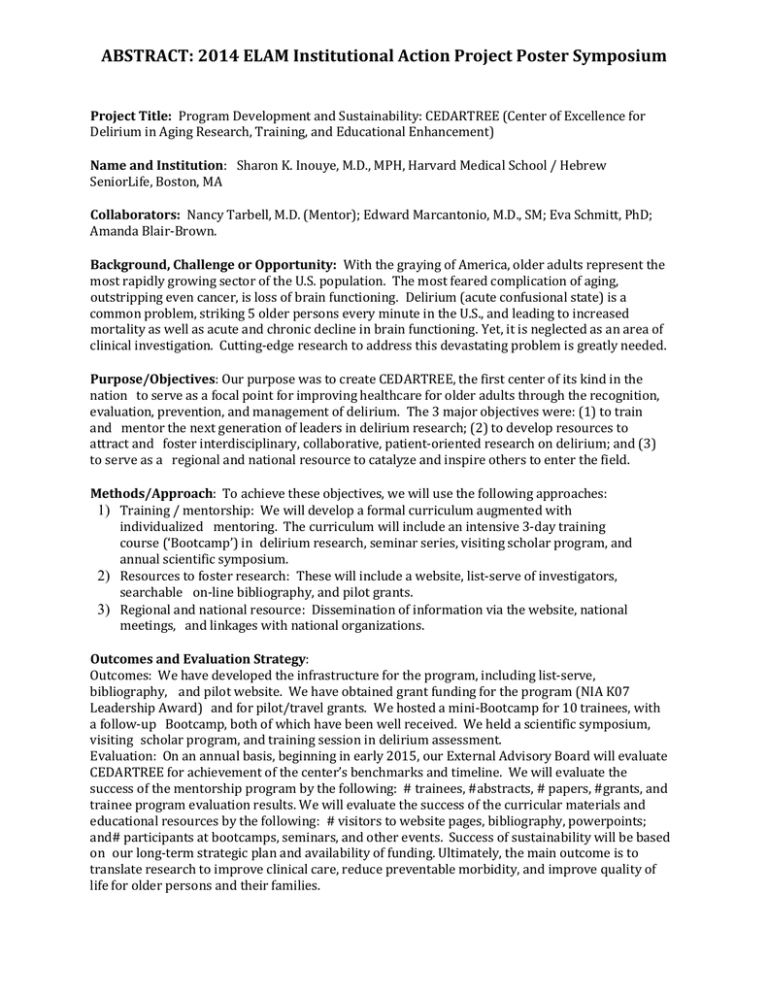
ABSTRACT: 2014 ELAM Institutional Action Project Poster Symposium Project Title: Program Development and Sustainability: CEDARTREE (Center of Excellence for Delirium in Aging Research, Training, and Educational Enhancement) Name and Institution: Sharon K. Inouye, M.D., MPH, Harvard Medical School / Hebrew SeniorLife, Boston, MA Collaborators: Nancy Tarbell, M.D. (Mentor); Edward Marcantonio, M.D., SM; Eva Schmitt, PhD; Amanda Blair-Brown. Background, Challenge or Opportunity: With the graying of America, older adults represent the most rapidly growing sector of the U.S. population. The most feared complication of aging, outstripping even cancer, is loss of brain functioning. Delirium (acute confusional state) is a common problem, striking 5 older persons every minute in the U.S., and leading to increased mortality as well as acute and chronic decline in brain functioning. Yet, it is neglected as an area of clinical investigation. Cutting-edge research to address this devastating problem is greatly needed. Purpose/Objectives: Our purpose was to create CEDARTREE, the first center of its kind in the nation to serve as a focal point for improving healthcare for older adults through the recognition, evaluation, prevention, and management of delirium. The 3 major objectives were: (1) to train and mentor the next generation of leaders in delirium research; (2) to develop resources to attract and foster interdisciplinary, collaborative, patient-oriented research on delirium; and (3) to serve as a regional and national resource to catalyze and inspire others to enter the field. Methods/Approach: To achieve these objectives, we will use the following approaches: 1) Training / mentorship: We will develop a formal curriculum augmented with individualized mentoring. The curriculum will include an intensive 3-day training course (‘Bootcamp’) in delirium research, seminar series, visiting scholar program, and annual scientific symposium. 2) Resources to foster research: These will include a website, list-serve of investigators, searchable on-line bibliography, and pilot grants. 3) Regional and national resource: Dissemination of information via the website, national meetings, and linkages with national organizations. Outcomes and Evaluation Strategy: Outcomes: We have developed the infrastructure for the program, including list-serve, bibliography, and pilot website. We have obtained grant funding for the program (NIA K07 Leadership Award) and for pilot/travel grants. We hosted a mini-Bootcamp for 10 trainees, with a follow-up Bootcamp, both of which have been well received. We held a scientific symposium, visiting scholar program, and training session in delirium assessment. Evaluation: On an annual basis, beginning in early 2015, our External Advisory Board will evaluate CEDARTREE for achievement of the center’s benchmarks and timeline. We will evaluate the success of the mentorship program by the following: # trainees, #abstracts, # papers, #grants, and trainee program evaluation results. We will evaluate the success of the curricular materials and educational resources by the following: # visitors to website pages, bibliography, powerpoints; and# participants at bootcamps, seminars, and other events. Success of sustainability will be based on our long-term strategic plan and availability of funding. Ultimately, the main outcome is to translate research to improve clinical care, reduce preventable morbidity, and improve quality of life for older persons and their families. CEDARTREE: Program Development and Sustainability HARVARD MEDICAL SCHOOL TEACHING HOSPITAL Sharon K. Inouye, M.D., MPH Collaborators: N. Tarbell, E. Marcantonio, E. Schmitt, A. Blair-Brown Harvard Medical School/Hebrew SeniorLife Background and Opportunity Methods/Approach With the graying of America, older adults represent the most rapidly growing sector of the U.S. population. The most feared complication of aging, outstripping even cancer, is loss of brain functioning. Delirium (acute confusional state) is a leading brain disorder striking 5 older persons every minute, and leading to increased dementia and mortality. Yet, delirium is neglected as an area of clinical investigation. Yearly evaluation planned by External Advisory Board beginning in 2015. Success of the mentorship program evaluated by: # trainees, #abstracts, # papers, #grants, and trainee program evaluation. Success of the educational resources by: # visitors to website pages, bibliography, powerpoints; and # participants at bootcamps and seminars. Success of sustainability by long-term strategic plan and availability of funding. Cutting-edge research to address this devastating problem is urgently needed Discussion / Next Steps Purpose/Objective Our purpose was to create CEDARTREE, the first center of its kind in the nation to serve as a focal point for improving healthcare for older adults through the recognition, evaluation, prevention, and management of delirium. The 3 major objectives were: (1) To train and mentor the next generation of leaders in delirium research; (2) To develop resources to attract and foster interdisciplinary, collaborative, patient-oriented research on delirium; and (3) To serve as a regional and national resource to catalyze and inspire others to enter the field CEDARTREE Bootcamp 2014 Evaluation Strategy Infrastructure developed Initial events held Fund-raising efforts Outcomes to Date • Developed list-serve, bibliography, pilot website • Mentors, mentees, Steering Committee assembled • Conducted initial Bootcamp, Delirium Assessment Training, and Scientific Symposium • Hosted Visiting Scholar • Initial 5-year grant obtained to fund program (NIH) • Grant funding raised for pilot and travel grants Presented at the 2014 ELAM® Leaders Forum Successful initial implementation, well received by mentors and mentees Steering Committee assembled External Advisory Group to be invited Refine and extend curriculum and resources Ongoing fund-raising efforts to assure sustainability Fulfill all program benchmarks and timeline Ultimately, our main goal is to translate research to improve clinical care, reduce preventable morbidity, and improve quality of life for older persons and their families. CEDARTREE Steering Committee Program funded in part by NIA K07AG041835
